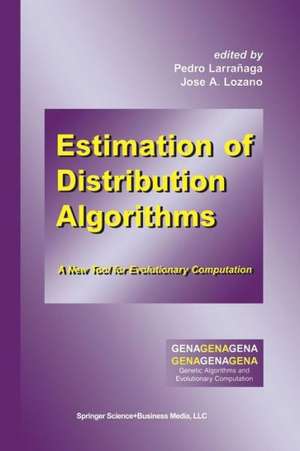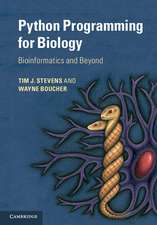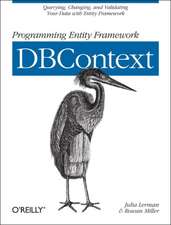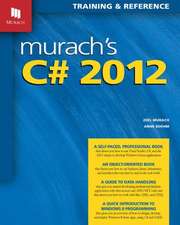Estimation of Distribution Algorithms: A New Tool for Evolutionary Computation: Genetic Algorithms and Evolutionary Computation, cartea 2
Editat de Pedro Larrañaga, José A. Lozanoen Limba Engleză Paperback – 30 oct 2012
This text constitutes the first compilation and review of the techniques and applications of this new tool for performing evolutionary computation. Estimation of Distribution Algorithms: A New Tool for Evolutionary Computation is clearly divided into three parts. Part I is dedicated to the foundations of EDAs. In this part, after introducing some probabilistic graphical models - Bayesian and Gaussian networks - a review of existing EDA approaches is presented, as well as some new methods based on more flexible probabilistic graphical models. A mathematical modeling of discrete EDAs is also presented. Part II covers several applications of EDAs in some classical optimization problems: the travelling salesman problem, the job scheduling problem, and the knapsack problem. EDAs are also applied to the optimization of some well-known combinatorial and continuous functions. Part III presents the application of EDAs to solve some problems that arise in the machine learning field: feature subset selection, feature weighting in K-NN classifiers, rule induction, partial abductive inference in Bayesian networks, partitional clustering, and the search for optimal weights in artificial neural networks.
Estimation of Distribution Algorithms: A New Tool for Evolutionary Computation is a useful and interesting tool for researchers working in the field of evolutionary computation and for engineers who face real-world optimization problems. This book may also be used by graduate students and researchers in computer science.
`... I urge those who are interested in EDAs to study this well-crafted book today.' David E. Goldberg, University of Illinois Champaign-Urbana.
| Toate formatele și edițiile | Preț | Express |
|---|---|---|
| Paperback (1) | 1277.70 lei 6-8 săpt. | |
| Springer Us – 30 oct 2012 | 1277.70 lei 6-8 săpt. | |
| Hardback (1) | 1286.10 lei 6-8 săpt. | |
| Springer Us – 31 oct 2001 | 1286.10 lei 6-8 săpt. |
Preț: 1277.70 lei
Preț vechi: 1597.12 lei
-20% Nou
Puncte Express: 1917
Preț estimativ în valută:
244.55€ • 263.97$ • 205.05£
244.55€ • 263.97$ • 205.05£
Carte tipărită la comandă
Livrare economică 18 aprilie-02 mai
Preluare comenzi: 021 569.72.76
Specificații
ISBN-13: 9781461356042
ISBN-10: 1461356040
Pagini: 420
Ilustrații: XXXIV, 382 p.
Dimensiuni: 155 x 235 x 22 mm
Greutate: 0.59 kg
Ediția:2002
Editura: Springer Us
Colecția Springer
Seria Genetic Algorithms and Evolutionary Computation
Locul publicării:New York, NY, United States
ISBN-10: 1461356040
Pagini: 420
Ilustrații: XXXIV, 382 p.
Dimensiuni: 155 x 235 x 22 mm
Greutate: 0.59 kg
Ediția:2002
Editura: Springer Us
Colecția Springer
Seria Genetic Algorithms and Evolutionary Computation
Locul publicării:New York, NY, United States
Public țintă
ResearchCuprins
I Foundations.- 1 An Introduction to Evolutionary Algorithms.- 2 An Introduction to Probabilistic Graphical Models.- 3 A Review on Estimation of Distribution Algorithms.- 4 Benefits of Data Clustering in Multimodal Function Optimization via EDAs.- 5 Parallel Estimation of Distribution Algorithms.- 6 Mathematical Modeling of Discrete Estimation of Distribution Algorithms.- II Optimization.- 7 An Empirical Comparison of Discrete Estimation of Distribution Algorithms.- 8 Results in Function Optimization with EDAs in Continuous Domain.- 9 Solving the 0-1 Knapsack Problem with EDAs.- 10 Solving the Traveling Salesman Problem with EDAs.- 11 EDAs Applied to the Job Shop Scheduling Problem.- 12 Solving Graph Matching with EDAs Using a Permutation-Based Representation.- III Machine Learning.- 13 Feature Subset Selection by Estimation of Distribution Algorithms.- 14 Feature Weighting for Nearest Neighbor by EDAs.- 15 Rule Induction by Estimation of Distribution Algorithms.- 16 Partial Abductive Inference in Bayesian Networks: An Empirical Comparison Between GAs and EDAs.- 17 Comparing K-Means, GAs and EDAs in Partitional Clustering.- 18 Adjusting Weights in Artificial Neural Networks using Evolutionary Algorithms.




















